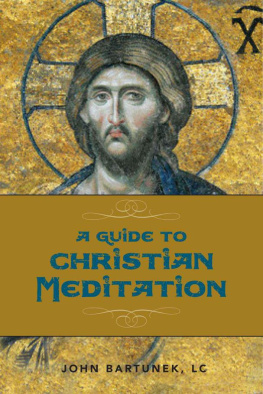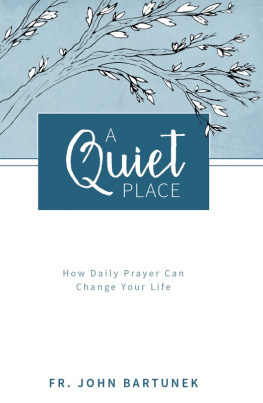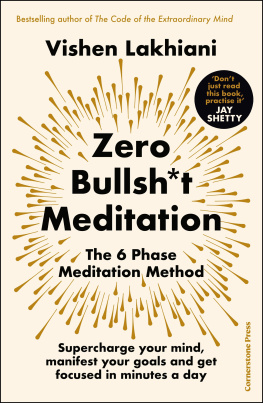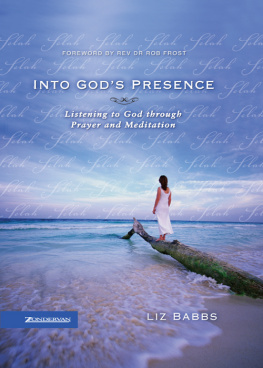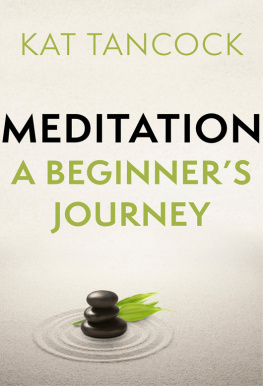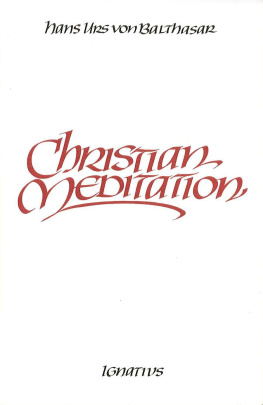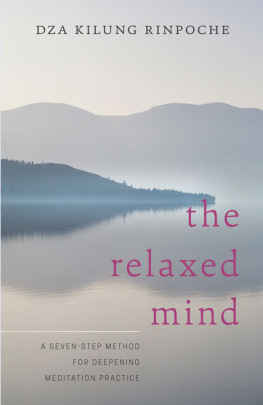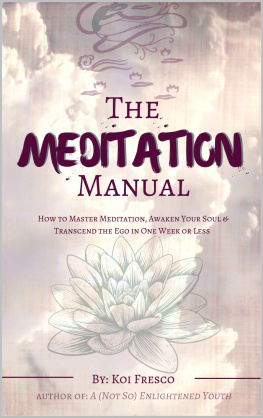A GUIDE TO
CHRISTIAN
MEDITATION
Taken from
THE BETTER PART
A Christ-Centered Resource for Personal Prayer
JOHN BARTUNEK, LC
CIRCLE PRESS
Copyright 2010 Circle Press, a division of Circle Media, Inc.
All rights reserved. No part of this work shall be reproduced, transmitted, or stored in any form whatsoever, printed or electronic, without prior written permission from the publisher.
Cover image: Mosaics: taken from the Basilica of St. Paul Outside the Walls, Rome
Cover and interior design by Rule29 Creative | www.rule29.com
Gospel text taken from The Jerusalem Bible by Alexander Jones, ed., copyright 1966 by Darton, Longman & Todd, Ltd. and Doubleday, a division of Random House, Inc. Used by permission of Doubleday, a division of Random House, Inc.
Imprimi Potest:
Francisco Mateos, LC
Nihil Obstat
Imprimatur
Most Reverend Henry J. Mansell
Archbishop of Hartford
June 14, 2007
ISBN: 978-1-933271-37-8
Printed in the United States of America
10 9 87 65 432 1
TABLE OF CONTENTS
PUBLISHERS NOTE
In every era, God provides voices of clarity and light to aid pilgrims in their quest for a deeper relationship with him. The best of them are not necessarily innovators but are innovative in the sense that they bring timeless wisdom within reach of those of their time. Father John Bartunek is one of the best of our time. He is an insightful and faithful guide to those who desire to delve more deeply into the riches of Christ and his Church. A little more about Father John might be in order.
As Father John emerged from his decade of seminary studies, he found himself working within one of the most profound films of our lifetime, The Passion of The Christ. To wrap up his work and provide us with fascinating and multilayered insight into the film, he penned Inside the Passion, the only authorized insider look at this great work of art. Since then, he has blessed tens of thousands of priests, religious and lay-people with his writings and public speaking. His latest work, The Better Part a Christ Centered Resource for Personal Prayer is currently in its third printing. The book you are reading now is the second derivation from the rich resources found in The Better Part. (The first was Meditations for Mothers.) Because of the widespread enthusiasm of so many who encounter him, it was clear that we needed to ensure broader access to Father Johns insightful and practical overview of authentic Christian meditation thus this small volume, Fundamentals of Christian Meditation.
In this book, after a brief historical introduction to Christian meditation, Father John provides both an elegant and memorable method for meditation along with very helpful examples of specifically how to put this method into practice. He manages to do this while keeping our sights on Christ, not the method. This emphasis helps the reader to avoid common and unfortunately popular errors that overemphasize the means and deemphasize the all-important end a deeper relationship with Christ himself.
May your faith, and the faith of those you love, be uniquely blessed by this important work.
Seek Him Find Him Follow Him

Dan Burke
Executive Director, Circle Media
PS: For weekly doses of Father Johns wisdom along with that of the saints and other wise and timeless spiritual advisors, check out our Web site at www.RCSpiritualdirection.com/blog.

INTRODUCTION

A DIP INTO HISTORY
The method of prayer explained in this book can trace its origins even to the pre-Christian era. The chosen people of the Old Testament appreciated the unique quality of Gods Word, and sought to encounter him there. Indeed, Jesus himself spent long nights in prayer, and the words of the Psalmist can be best applied to him: But his delight is in the law of the Lord, and on his law he meditates day and night (Ps 1:2). The first generation of Jewish converts brought that tradition with them into the early Christian communities. Pagan converts, many of whom had been educated in the rich literary culture of Hellenism, quickly learned to combine their erudite skills of textual analysis with a resplendent faith in Scriptures inspiration. But the widespread use of the Bible for personal meditation advanced only in fits and starts during the first three Christian centuries, mostly due to the ceaseless waves of violent persecution that repeatedly destabilized Church life.
Nevertheless, personal and small group reading and meditation on Holy Writ was part of the Christian DNA even in those tumultuous centuries. In the year 303, an intrepid Christian woman named Irene was arrested (along with her two sisters) for refusing to worship idols. While in prison, a search of her house uncovered some forbidden copies of New Testament writings (at that time, forbidding the possession of Scripture was a tactic aimed at suffocating the growing Christian Church). Brought before the governor for interrogation and asked who had ordered her to keep the documents in direct defiance of the emperors edict, Irene gave brave testimony: Almighty God, who has commanded us to love him unto death. For that reason we prefer to be burnt alive rather than give up the Holy Scriptures and betray him....They were hidden in the house, but we dared not produce them: we were in great trouble because we could no longer read them day and night as we had been accustomed to do.
Once the Age of Persecution had passed, this love for the inspired Word became the heart of the monastic movement in the Christian East and West. Creating a stable, austere community life based on work, prayer, and practicing the Christian virtues, monasticism fostered an environment in which copies of the Bible could be made more easily and the texts studied and meditated over more readily and frequently by a greater number of people (monasteries and convents often had hundreds of members from all strata of society). Thus the practice of lectio divina (divine reading) developed.
In these centuries, the majority of church-going Christians had only rudimentary (if any) reading skills, and there would sometimes be only one Bible for an entire parish community. This would be kept in a common room, chained to a table, rather like telephone books in twentieth century phone booths. Even so, the Word of God was amply communicated in both sermons and works of art, and Christians with just a smattering of formal education could, therefore, often boast of a thorough familiarity with the Scriptures.
Only with the advent of the printing press, however, towards the middle of the second Christian millennium, did it become possible for average Christians to own personal copies of the Bible. At the same time, the turbulence of early modern European life created a social environment in which lectio divina as practiced by the monks was less easily emulated. Multiple new methods (and variations on old methods) of meditating on the Bible emerged, and the surest ones stood the test of time. The common elements of those form the substance of what is presented here, and they are explained in light of the peculiar challenges to prayer posed by a mass-media-saturated social milieu.
THE IMPORTANCE OF PERSONAL PRAYER

